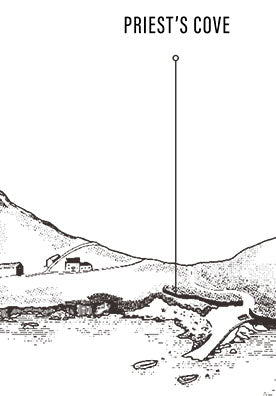Standing proud on the Duke of Cornwall’s coat of arms alongside two other endangered species, the Cornish Chough has long been associated with Cape Cornwall. In fact, the Welsh word for a Chough is Bran Gernyw which means “Crow of Cornwall”. Choughs have been recorded as part of Cornish history since (at least) the 13th century. According to Cornish legend, King Arthur did not die after his last battle - he was transformed into a Red-billed Chough… but did you know that the Cornish Chough is also a bird accused of arson? While most choose to live in north Wales and the Isle of Man, the Choughs which have recently returned to Cornwall are closely observed by a voluntary group of carers called “
Chough Watchers”. There is also an active
Cornish Chough Conservation Network to monitor the Chough’s expanding population and RSPB's
Cornwall Chough Project, which operates in in partnership with the National Trust, English Nature, and the
Cornwall Birdwatching and Preservation Society (CBWPS).

According to ornithologists, there are only around 300 breeding pairs of Choughs in the UK - a tiny number by any measure. The Chough, however, does live for a long period of time, pairing up and living together for up to 20 years. Choughs pair up for life and are monogamous creatures. These glossy black birds with prominent red legs and bills are usually found in pairs - or in a group of five or six birds - and have a distinctive “chee-ow” call as they take flight. These conversational and charismatic creatures are known to be noisy and the sound they make also ties into the name for a group of Choughs which is (unsurprisingly) called a chattering. The tell-tale call of the Chough also links to its unusual name. While it is written as Chough and pronounced "Chuff", it was originally said as "Chow". And their name in Cornish - Palores - means digger, which is exactly how the Chough finds its food.
The Red-billed Chough - which is often called a Cornish Chough - is part of the Crow family. There are only two species of birds called Choughs that make up the pyrrhocorax pyrrhocorax genus. While it is said that this scientific name came from its red, flame-like beak, many believe it is because the Chough has been accused of starting fires and burning houses down. This myth is something told over by Daniel Defoe, the author of Robinson Crusoe, in his three-volume travel book, Tour Through the Whole Island of Great Britain was published between 1724 and 1727.
While the Chough does call Cornwall its home, in the 16th and 17th centuries it was said that the bird often stole things out of shops… items that included lit candles and burning wood. Once stolen, the Chough would place his thieved goods on a thatched roof or upon a stack of corn which would indeed cause houses to burn down. Yet Choughs were not killed - that was considered unlucky.

Being a kind of Crow, Choughs are smart birds and studies have shown that they manage quite well around people. If anything, they’re not wary of humans which is why Choughs were often caught, domesticated and sold as pets which could have also led to their untimely decline in 1973. That, and the ongoing degradation of their preferred habitat.
While many though the Cornish Chough was gone forever, mourning the loss of their national bird, the Chough’s return in 2001 was the cause of much speculation. Were these the same storied birds of long ago? Scientists from the University of Aberdeen conducted genetic testing on and found that these Choughs were indeed of Irish origin.
In 2021, 23 pairs of Cornish Chough bred successfully, raising a record-breaking 66 young - a huge achievement for a bird once believed extinct. The return of Choughs to Cornwall is of great importance to the region, signifying restoration for the southernmost corner of the UK. Impressively aeronautic, Choughs are truly intriguing birds. They’re the unmistakeable ravens of fire, a bird whose tale is told in legends and an important part of Kernow heritage.









